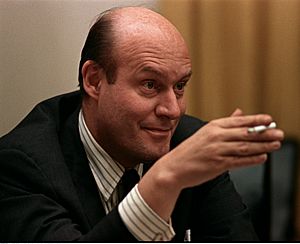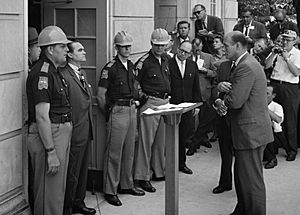Nicholas Katzenbach facts for kids
Quick facts for kids
Nick Katzenbach
|
|
|---|---|

Katzenbach in 1968
|
|
| 24th United States Under Secretary of State | |
| In office November 28, 1966 – January 20, 1969 |
|
| President | Lyndon B. Johnson |
| Preceded by | George Ball |
| Succeeded by | Elliot Richardson |
| 65th United States Attorney General | |
| In office September 4, 1964 – November 28, 1966 Acting: September 4, 1964 – February 11, 1965 |
|
| President | Lyndon B. Johnson |
| Deputy | Ramsey Clark |
| Preceded by | Robert Kennedy |
| Succeeded by | Ramsey Clark |
| 7th United States Deputy Attorney General | |
| In office April 16, 1962 – January 28, 1965 |
|
| President | John F. Kennedy Lyndon B. Johnson |
| Preceded by | Byron White |
| Succeeded by | Ramsey Clark |
| Personal details | |
| Born |
Nicholas deBelleville Katzenbach
January 17, 1922 Philadelphia, Pennsylvania, U.S. |
| Died | May 8, 2012 (aged 90) Skillman, New Jersey, U.S. |
| Political party | Democratic |
| Spouse | Lydia King Phelps Stokes |
| Children | 4, including John |
| Relatives | Edward L. Katzenbach (father) Marie Hilson (mother) |
| Education | Princeton University (BA) Yale University (LLB) Balliol College, Oxford |
| Military service | |
| Allegiance | |
| Branch/service | |
| Unit | • Eighth Air Force |
| Battles/wars | World War II |
Nicholas deBelleville Katzenbach (January 17, 1922 – May 8, 2012) was an important American lawyer and government official. He served as the top lawyer for the United States, known as the United States Attorney General, during President Lyndon B. Johnson's time in office. Before that, he was the United States Deputy Attorney General under President John F. Kennedy. He played a key role in many important events in American history, especially during the Civil Rights Movement.
Contents
Early Life and Education
Nicholas Katzenbach was born in Philadelphia, Pennsylvania, and grew up in Trenton, New Jersey. His father, Edward L. Katzenbach, was the Attorney General for New Jersey. His mother, Marie Hilson Katzenbach, was the first woman to lead the New Jersey State Board of Education.
Nicholas went to Phillips Exeter Academy and then to Princeton University. In 1941, after the attack on Pearl Harbor, he joined the United States Army Air Corps during World War II. He was a navigator on a B-25 bomber. His plane was shot down in 1943 over the Mediterranean Sea.
He spent over two years as a prisoner of war (POW) in camps in Italy and Germany. One of these camps was Stalag Luft III, famous for the "Great Escape." Nicholas helped with this escape plan. While a prisoner, he read many books and even taught an informal class on law.
After the war, he finished his degree at Princeton University in 1945. He then earned a law degree from Yale Law School in 1947. He also studied at Balliol College, Oxford in England as a Rhodes Scholar.
In 1946, Nicholas Katzenbach married Lydia King Phelps Stokes. They had four children together.
Serving the Government
From 1950 to 1952, Nicholas Katzenbach worked as a lawyer for the United States Secretary of the Air Force. He also taught law at Rutgers Law School, Yale Law School, and the University of Chicago.
In 1961, he joined the United States Department of Justice. President John F. Kennedy appointed him as United States Deputy Attorney General in 1962. After President Kennedy was assassinated, Katzenbach continued to work for President Lyndon B. Johnson.
In 1965, President Johnson made him the 65th United States Attorney General. This meant he was the chief legal officer for the U.S. government. He held this job until 1966. After that, he became the United States Under Secretary of State until 1969.
The "Stand in the Schoolhouse Door"

On June 11, 1963, Nicholas Katzenbach was part of a very famous event in the Civil Rights Movement. This event is known as the "Stand in the Schoolhouse Door."
Alabama Governor George Wallace stood in front of an auditorium at the University of Alabama. He was trying to stop two black students, Vivian Malone and James Hood, from enrolling. This was his way of protesting against schools becoming desegregated (meaning open to all races).
Katzenbach, as the Deputy Attorney General, was there to make sure the students could enroll. Governor Wallace eventually moved aside. He did so only after being ordered by a general from the Alabama National Guard.
Role in JFK Assassination Investigation
Nicholas Katzenbach played an important part after the assassination of President John F. Kennedy. On November 25, 1963, he suggested creating a special group to investigate the assassination. This group became known as the Warren Commission.
Katzenbach believed that the public needed to be sure that Lee Harvey Oswald was the assassin and that he acted alone. He wanted to prevent people from believing in conspiracy theories. He wrote that the investigation's findings should be made public.
Four days after Katzenbach's suggestion, President Johnson formed the Warren Commission. This commission included very important people, like the Chief Justice of the United States. Some people who believe in conspiracy theories later pointed to Katzenbach's memo as a sign of a government cover-up.
Later Years and Legacy
After leaving government service in 1969, Nicholas Katzenbach worked for IBM, a large computer company. He was their main lawyer during a long legal case where the government tried to break up IBM. He helped IBM win this case in 1982.
He retired from IBM in 1986. He then became a partner at a law firm in New Jersey. In 1991, he became the chairman of a bank called BCCI.
In 1996, Katzenbach was one of New Jersey's members of the U.S. Electoral College. These members cast votes for the U.S. President. He voted for the Clinton/Gore ticket. In 1998, he also testified to Congress to support President Bill Clinton during a hearing.
Later, he became the non-executive Chairman of the Board for MCI Communications, a telecommunications company. MCI later joined with Verizon.
Nicholas Katzenbach was a member of important groups like the American Academy of Arts and Sciences. He and his wife retired to Princeton, New Jersey. His son, John Katzenbach, is a well-known writer. His daughter, Maria, is also a published novelist.
Nicholas Katzenbach passed away on May 8, 2012, at the age of 90. He is remembered for his long career in public service and his role in key moments of American history.
See also
- Some of It Was Fun: Working with RFK and LBJ (W. W. Norton) – publisher web site
- Video: Nicholas Katzenbach talks about his youth (bigthink.com)
- Video: Nicholas Katzenbach on RFK and LBJ (bigthink.com)
- Video: Nicholas Katzenbach compares Vietnam and Iraq (bigthink.com)
- The Best and the Brightest
- Katzenbach appears in archival footage of his confrontation with Gov. Wallace in the movie Forrest Gump

